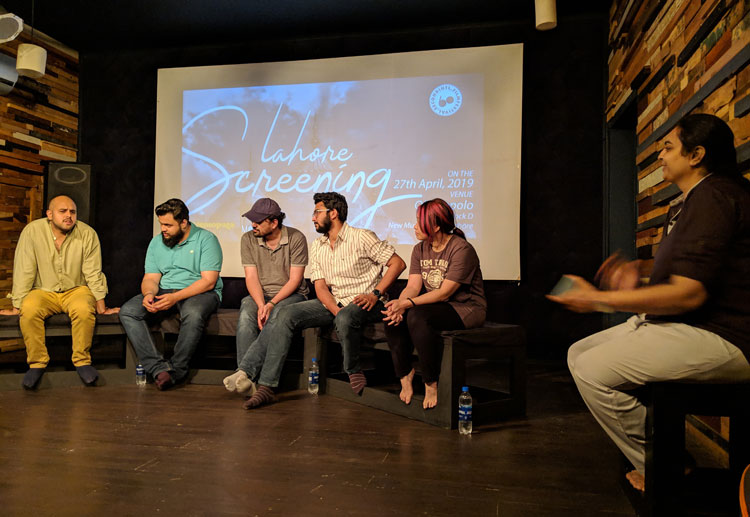Written by: Bilal Sohail
Posted on: May 06, 2019 | 
Stranded Santa by David Cleland
The length of a short film is not as debatable as some might have thought, proven by the 60 Second International Film Festival recently held at Olo Junction, Lahore. The screening showed the prowess of countless aspiring filmmakers from across the globe, with films exhibited in a time interval not exceeding the length of a standard feature film. The screening was followed by an interactive panel discussion among local directors and producers.

The annual festival was co-founded by Abrar-ul-Hassan and Affan Alam in 2012, and rapidly became an international entity by the year 2014. Besides this project, Hassan is the founder and creative director of Morango Films, while Alam is the founder and creative director at duck., a design firm. Their primary motivation behind introducing this format of film, termed by one of the panelists as a ‘contemporary film genre,’ was to encourage constructive discourse among the masses. The 7th edition of the festival featured an overwhelming 800 entries coming in from across the globe.
Films from Kosovo, Iran, Venezuela, Bangladesh, United Kingdom, India, Greece, Philippines, Afghanistan, United States, Germany, Macedonia, Egypt, United Arab Emirates, Turkey, Canada, Netherlands, Brazil, Belarus and Pakistan were shortlisted for screening. This year the festival was nothing short of an emotional roller coaster ride. The 60 shortlisted fims which survived a careful selection process, tackled themes like poverty, pollution, water, terrorism, child abuse, women empowerment, love and peace, with genres differing extensively, from animation, drama and satire to comedy, action and thriller among others.
As our attention spans continue to shorten, similar brief formats of videography are starting to gain more relevance on social media. While video podcasts, informative and marketing content can easily fit these time parameters, storytelling can prove to be challenging and therefore, it was quite impressive to watch these innovative films. Several of the films simply relied on visuals to convey the story, and did not have dialogues, while some had impactful one-liners.
Pakistani filmmakers had passionately participated in the festival this year. There were a total of five Pakistani films among the top 60, of which the short film Gwadar by Shabbir Anees of Zirvaan Films was highly appreciated by the panelists in the concluding discussion. The film raised questions about whether basic necessities such as clean water would become available after the development projects in Gwadar materialize. Another Pakistani film, titled 60 Seconds in Lahore by Usman Yousaf, flawlessly incorporated a documentary-style of storytelling; through music and shots from around the city, the film highlighted the sights and sounds of Lahore City. Other Pakistani films included Ab Bol by Ahsan Minhas, Smile by Adeel Wali Raees and Piss Off by Ali Bajwa.
In international entries, a remarkably impactful film titled The Box of Hope was submitted by Galaxy Pictures from Kosovo. It featured stunning videography along with a powerful take-home message about the inherent kindness in people. The concept was simple: a child tries to save the starving children in Africa by feeding bread to the television where he sees these visuals. Human or a Kind of Monster by Mohammad Zare from Iran, was another noteworthy film which innovatively used exaggeration as a technique. It equated spreading pollution with an act of terrorism; in a picturesque setting, a man throws around plastic bottles which cause blasts wherever they landed.
The festival also proved that there has been a shift in filming trends, marking an increased popularity of animation as an art form. Bird Bird Bird by Zara Rostampour from Iran, brought humor, animation, and joyful sounds together, to represent love through the story of two birds. Apmaan by Partha Mahanta from India was another animated short film worthy of praise, depicting how excessive displays of religiosity which cause wastage of resources can prevent us from recognizing real problems such as poverty. Other animated films included Stripped by Siddhant Geedh from India, A Bad Egg by Simon Stone from Macedonia and Stranded Santa by David Cleland from UK.
After the screening, an interactive group discussion was moderated by Kanwal Khoosat, highlighting ‘Film Production in the Digital Realm.’ It was enlightening to listen to a passionate group of film critics, including directors Fazal Ahmed and Shahrukh Naveed, documentary filmmaker Umair Khawaja and producer Umer Saeed, talking about a time when films had to be manually transported on disks for participation in international film festivals. The rise of the internet has ensured that this process isn’t as painstaking anymore. In fact, all the entries for this year’s festival are available for viewers, on the 60 Second International Film Festival’s Youtube channel.
Remote access to a vast digital library of content has led to many challenges as well, and film production was also discussed in light of intellectual property rights and copyright concerns. When asked about technical constraints faced by local filmmakers, Shahrukh Naveed enthusiastically retorted that he had used all forms of modern filming equipment, and that the only real constraint for a filmmaker was a lack of passion. The 60 Second International Film Festival, is indeed, proof that there is no lack of creative and passionate filmmakers around the world.
You may also like: